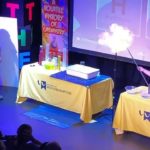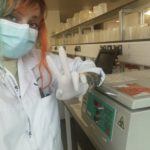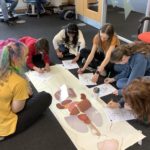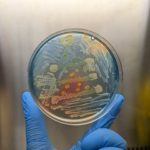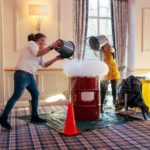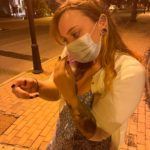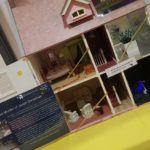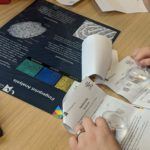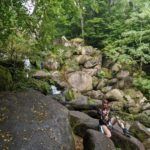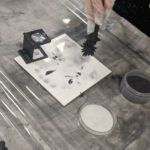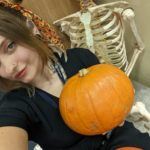Profile
Heather Angell
-
About Me:
Hi everyone, my name is Heather!
I am also a scicomm’er and currently doing my PhD in forensic taphonomy (what happens to a body after death but before discovery) and forensic microbiology (bugs well bacteria but bugs sounds cuter, fungi and other micro-organisms and their application to forensics).
-
Read more
I am 27 and I’m from the Black Country in the West Midlands
I provide STEM (science, technology, engineering and maths) outreach activities (including forensics as this is of course my specialism) for individuals of all ages all over the UK. I am also a postgraduate researcher investigating how the necrobiome (the bugs/organisms present after death) can be used to help estimate the post-mortem interval (how long someone has been dead).
I live with my two kitty cats (Molly and Ellie). I love nature and exploring the outdoors. I am currently obsessed with Harry’s House (if you haven’t listened to this album you are definitely missing out). I love food and cooking/baking.
-
My pronouns are:
she/her
-
My Work:
I am researching ways of assisting in estimating how long someone may have been dead and I also provide STEM outreach activities for people of all ages all over the country.
-
My Typical Day:
My typical days can be split into two general types depending on whether I am providing/delivering STEM outreach activities or doing some laboratory research. But both involve early starts, many cups of coffee or energy drinks, discussing STEM and science that I love, fun and laughter and new discoveries!
-
Read more
My typical day if I am providing STEM outreach activities:
My day begins with my alarm going off at half 5 am (I know right, I also think I am crazy) as this gives me plenty of time to get ready and leave for work. Sometimes I get a lovely slow relaxed leisurely morning and sometimes I need to leave the house as quickly as I can and this all depends on where I am going and what school/home-educating community I see on that day. Thankfully we would have loaded the van the day before as when we provide outreach activities we don’t just turn up to your school/location with a laptop and memory stick, we bring with us LOADS of equipment to make sure you have a fun and engaging session. The outreach session we provide completely depends on what it is that we’ve been asked to do. We provide workshops which cater for a class at a time, we provide science theatre shows which can cater for hundreds of students at a time and we provide skills sessions and inspiration lectures too – check out our video The STEM Response Team. So in one day, I can provide outreach sessions for anywhere between 30 students and 600!
My typical day if I am doing research in the laboratory:
My day begins with my alarm going off at half 5 am as this gives me plenty of time to get ready and leave for work. I get to the University around 8amish but go to the lab around 9am to 9:30am and have a good old chat with the lovely technicians. Then I begin my research and this honestly completely depends on what I am doing on that day – it could be making some media to grow microorganisms, pouring hundreds of agar plates which are essentially petri dishes filled with a jelly-like substance which provides the bacteria with all the good stuff it needs to grow, tests to identify what bacteria are present, microscopy, taking air samples of smelly things to see what organisms/bacteria are present (as its bacteria and microorganisms that make these bad smells are they provide something called volatile organic compounds). taking photographs of decomposing pigs and taking samples of the decomposing pigs – the list is endless. Of course I have lunch and coffee breaks (coffee is always needed). Then I leave around 5pm and do it all again another day!
-
What I'd do with the prize money:
I would use the money to develop a forensic intervention that would be accessible to students who have visual impairments. Many outreach interventions and taught STEM subjects contain activities and learning that could be challenging for students with visual impairments as the activities or learning can rely on visual understanding and interpretation to complete the task/activity e.g. identification of the stage of decomposition, identifying an insect and whether it is forensically relevant, identifying key features of a fingerprint etc.
Therefore, I would focus on one or two topics within the field of forensics and develop activities to explain these topics. So for example, creating 3D-printed models to explore and explain first and second-level details within fingerprints where students can feel the differences between the patterns and the differences in ridges.
-
Education:
Phoenix Collegiate High School, West Bromwich, UK
Phoenix Collegiate Sixth Form, West Bromwich, UK
University of Wolverhampton, Wolverhampton, UK -
Qualifications:
GCSEs:
- Triple Science (Biology, Chemistry and Physics) – B
- English (Language and Literature) – B
- Maths – C
- History – B
- Sociology – C
- Photography – B
- German – C
- Latin – E
FCSE:
- German – Distinction
A Levels:
- Biology – D
- History – B
- Psychology – C
Masters in Science (Honours), Forensic Science – 1st
Pending- Doctor of Philosophy (PhD), Forensic Taphonomy and Forensic Microbiology
-
Work History:
- Cinema Host, ODEON Cinemas Group
- Cinema Experience Manager, ODEON Cinemas Group
- STEM Outreach and Public Engagement Intern, University of Wolverhampton
- STEM Outreach and Public Engagement Assistant, University of Wolverhampton
-
Current Job:
STEM Outreach and Public Engagement Assistant & PhD Researcher
-
Employer:
University of Wolverhampton
-
My Interview
-
What did you want to be after you left school?
I wanted a career in forensics. The CSI effect definitely worked
Were you ever in trouble at school?
Nope ... angel by name, angel by nature!
Who is your favourite singer or band?
Currently my not so guilty obsession is Harry Styles!
What's your favourite food?
Pasta!!
Tell us a joke.
I had this long fungi joke, but I don’t have enough shroom to type it.
-


